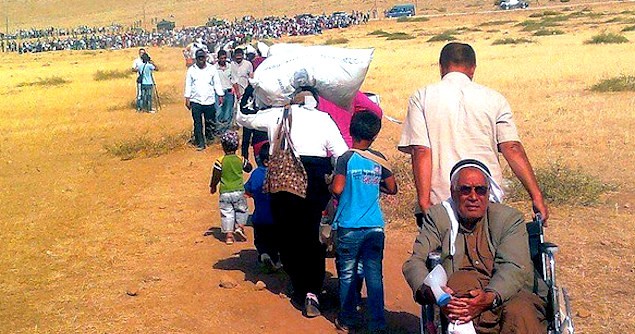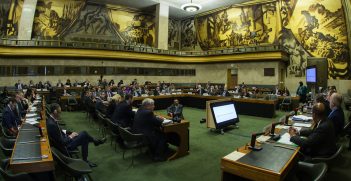Why is Turkey Faltering on its Security Promise?

Having declared its intention to join the fight against the Islamic State, now advancing in its skirts, Turkey is stalling in taking direct action. Hale Yildiz analyses the reasons behind Ankara’s puzzling strategy.
As the international combat against the Islamic State (IS) accelerates, Turkey remains by far the most critical potential member of the airstrike campaign led by the US. Indeed, President Recep Tayyip Erdoğan’s commitment to take military action against IS forces in Iraq and Syria came after 20 September, when Turkey’s “hostage crisis” was finally cleared. After the release of 46 staff members of the Turkish consulate in Mosul seized by IS militants on June 11, Turkey became seemingly more co-operative on the allied intervention to destroy the terrorist group once and for all.
However, Turkey has been faltering on delivering its promise, having been declared as a “Non-Ally”. In the midst of rapid IS advance, with the militants having recently raised their infamous flag a few kilometres from the Turkish border and President Erdoğan announcing that the Syrian Kurdish town Kobanê is ‘about to fall’ to IS hands, the Kurdish dissent over Ankara’s inaction is growing. Beyond Kurdish frustrations, this manifest reluctance of the Turkish army to intervene in heavy fighting beyond the border seems contradictory to the declaration made by Mr Erdoğan last Wednesday that it would be Turkey’s national priority to engage in destroying IS as well as ‘other terrorist organisations within the region’.
At the first glance, Turkey’s disinclination appears to be a mixed product of both inconsistent military policy and “clumsy politics”. However, the nation is faced with a more complex geopolitical reality than what immediately meets the foreign eye. As a historic “bridge state”, Turkey’s position in the fight against IS is quite dissimilar to that of member-states of the US-led coalition, and in particular, to distanced proxies like the UK and US.
Waves of refugees
First of all, Turkey is currently dealing with a growing number of Kurdish and Syrian refugees. In fact, the country has been facing a highly protracted and escalating refugee crisis since the dawn of the 2011 Syrian uprising that has since pushed more than 1.5 million refugees through Turkish borders. Having committed, quite half-heartedly, to an open-door policy for Syrians fleeing the Bashar Al-Assad regime, and with an estimated 185,000 Kurdish refugees displaced by IS’ advance arriving within weeks, the country is currently faced with the biggest strain in its spatial and financial capacities to accommodate the persecuted millions.
In a statement made on 24 September at the Australian National University by speaker of Turkish Parliament Cemil Çiçek, Ankara’s desire to commend and support the recent US-led airstrikes to the region is truncated by greater concerns over the threat posed to national integrity by the populations displaced by the intervention and fleeing into Turkey. In a sullen reminder of the pressure on its resources and having entered a slowdown phase of annual growth (from 8.8 per cent in 2011 to 2.1 per cent this year), Turkey is currently not receiving any material help to sustain its longstanding “open borders”.
Moreover, the escalating influx of refugees, reportedly nearing the two million mark, have contributed to social strife and antagonism in the border cities, as Syrians—the ones begging or squatting in big cities—are equated with the rise of crime and seen as a disruptive force on the nature of Turkish society. More recently, there have been 21 reported deaths in the ongoing clashes between the Turkish police and hundreds of Kurds anguished by Turkey’s hesitance.
The rooted Kurdish issue
Beyond the immediate refugee problem, Turkey also has a longstanding “Kurdish issue”. Prodigiously more protracted, the conflict spiralling steadily since the early 1980s has so far left over 35 thousand dead. Although in January 2013 then Prime Minister Erdoğan had announced the commencement of the peace talks with the PKK, the Kurdish group is still considered a terrorist organisation by the Turkish government, with President Erdoğan drawing similarities between PKK and IS.
Despite an ongoing peace process, with the government having established lucrative oil deals with the Kurdistan Regional Government (KRG) in northern Iraq, Turkey still lacks a clear peacebuilding strategy with the PKK. Conversely, there is growing dissent among the three Kurdish communities in Turkey, Iraq and Syria over the government’s reluctance to effectively address the IS advances on Kurdish territories in northern Iraq and Syria.
The bottom line is that, as a republic primarily preoccupied with the notion of security and territorial integrity since its inauguration in 1923, Turkey fears that direct intervention to its border regions facing Kurdish-IS ground fighting could eventually lead to a more militarily capable Kurdish faction. Further constraining Ankara is the possibility of arms meant to empower anti-IS groups making their way into PKK’s arsenal, to be potentially used against Turkey in the very-possible event of resurfacing enmities.
Too close to home
Add to this the proximity of the ongoing crisis. Simply put, the current fighting is taking place far too close to Turkish borders. The truth of the matter is that Turkey is highly concerned about the shallow nature of the immediate surface operation conducted by the allied forces, without a long-term strategy to address possible consequences. Indeed, when the party is over and everyone goes home; the ensuing power vacuum, shifting sectarian balances, as well as cyclical radicalisation will surpass the capacity of President Obama’s elusive “degrade and destroy” operation and will be wholly inherited by Turkey alone.
What Turkey currently sees is an increasingly incompetent NATO failing to manage the Ukrainian crisis to its north and a flimsy and largely impulsive US-led security intervention to the south. With much at stake, the crisis caused by IS is too close, too sensitive and far too under-planned for Turkey’s convenience.
Conflict of interest
All of this remains incomplete without bringing forth Turkey’s primary motivation to join the fight against IS. A major line of demarcation between the agenda adopted by Turkish armed forces and Western officials is on whether to target the regime of al-Assad. From the advent of the crisis in Syria, Turkey has been adamant to rid Syria of its controversial dictator, whom it has declared a mortal enemy. Ankara has also been pressing for the establishment of a buffer zone in Syria, in the form of a no-fly zone, to help manage the refugee influx.
Both of these demands, framed by President Erdoğan as key objectives for intervention, are seen as unrealistic and unfeasible by the current US-led coalition; making a holistic intervention strategy with Turkey as a key partner painstakingly difficult.
Verdict?
To be sure, Turkey’s IS strategy has been ambiguous at best, with an overtly unwilling Ankara to intervene amid announcements by President Erdoğan calling for “cooperation for a ground operation”. And as Turkey tries to negotiate its grievances in vain, the window of opportunity for effective intervention is rapidly narrowing. Caught between a rock and a hard place, both domestic tensions and border conflicts are escalating; with increasingly antagonised Kurds demanding Turkish action and IS pressing up its perimeters.
Yet, in order for Turkey to transform into a useful ally, Western leaders need to postulate a more far-reaching and long-term plan, not only to rid the region of IS but also to address ensuing regional instability. Unless Ankara’s primary concerns are acknowledged, demanding its full involvement remains not much more than a product of stereotypical Western hypocrisy.
Hale Yildiz is a current research intern and editor of Australian Outlook at the AIIA National Office. She can be reached at australianoutlook@internationalaffairs.org.au.





